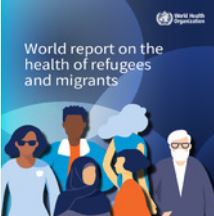Global report finds gap in refugee health outcomes
A world first report on refugee health has found that refugees often suffer worse health outcomes than host populations.
And it says this compounded by their vulnerable circumstances and poor health determinants.
 The World Health Organizations ‘World report on the health of refugees and migrants’ report is the first of its kind to illustrate with such breadth and specific detail the multitude of health challenges faced by hundreds of millions of refugees and migrants, drawing on evidence that is as comprehensive as possible from around the globe.
The World Health Organizations ‘World report on the health of refugees and migrants’ report is the first of its kind to illustrate with such breadth and specific detail the multitude of health challenges faced by hundreds of millions of refugees and migrants, drawing on evidence that is as comprehensive as possible from around the globe.
“Refugees and migrants often experience much worse health outcomes than host populations, compounded by their vulnerable circumstances and poor health determinants,” the report says.
This is “primarily due to suboptimal working and living conditions, which have a negative impact on the health and well-being of refugees, migrants and asylum seekers, among others”, it said.
The report says it is to address the determinants of poor health beyond the health sector when considering the health of refugees and migrants.
Two of the key findings of the report are the absence of comparable data across countries and over time on refugee and migrant health and the lack of disaggregation according to migratory status within global health data sets.
“There are critical gaps globally in data quality and knowledge of refugee and migrant health and investment in fit-for-purpose data, surveillance and monitoring is needed to support robust evidence-informed policies and plans for implementation,” the report says.
“If this vital data gap remains, refugees and migrants will continue to be left behind, and achieving the Sustainable Development Goals (SDGs) will be impossible,” it says.
“Climate change and the increased number of conflicts mean increasing numbers of people are on the move. The impact of anthropogenic climate change is already felt across 80 per cent of the world’s land area, which holds 85 per cent of the world’s population. It is predicted that over 200 million additional people will be forced to move by 2050.”
The report offers solutions to address health disparities for refugees and migrants and to address the root causes that negatively influence health – but these mostly fall outside the remit of traditional health sectors.
They include embedding refugee health as element of domestic health systems with whole-of-government and whole-of society approaches to ensure the health of refugees and migrants and their host populations.
“Existing health systems should be reorientated to include refugees and migrants in all services and programmes, in line with the principles of universal primary health care and universal health coverage.,” the report said.
“The health determinants, status and outcomes of refugees and migrants should be monitored to assess progress, or lack thereof, towards the SDGs and other goals and targets.
“Because the health and well-being of refugees and migrants cut across multiple sectors of society, the health sector must play an important leadership and facilitating role,” the report said.
The report says WHO’s Thirteenth General Programme of Work provides a framework for the urgent action necessary, prioritizing the guiding principles of promoting health, keeping the world safe from disease and focusing on the least-served, most vulnerable populations.
These align with the 2030 Agenda for Sustainable Development and its commitment to leave no one behind. WHO’s Global action plan on promoting the health of refugees and migrants also includes health as an essential component of protection and assistance for refugees and migrants and good migration governance.
Read the full report here: World report on the health of refugees and migrants: summary (who.int)












